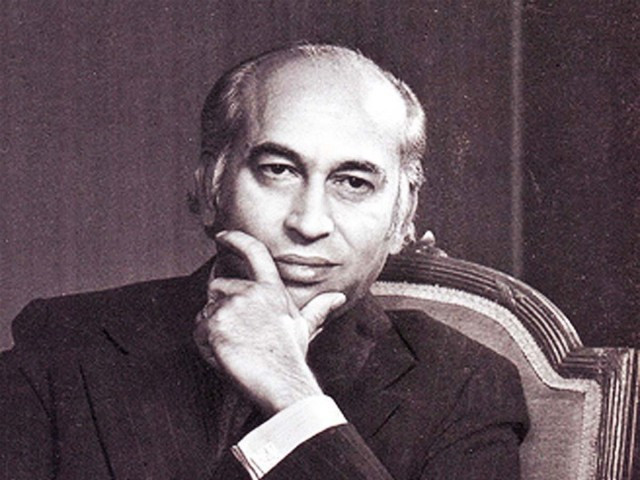Today marks his 34th death anniversary. There is no memorial site at the place of his death, just a huge park for families surrounded by the Army House and court rooms that keep his memory alive.

Bhutto had been politically aware from an early age. His grave interest in politics led him to write a letter to Mohammad Ali Jinnah on April 26, 1945 which read:
“You have inspired us and we are proud of you. Being still in school, I am unable to help the establishment of our sacred land. But the time will come when I will even sacrifice my life for Pakistan.”
Followed by the letter, he helped arrange a protest at his college in Bombay, under instructions of Jinnah himself.
Albeit, he was unable to pass his senior Cambridge exam the first time around, he re-took it and later took admission in University of Southern California (USC).
His passion did not end here; he later volunteered for the Pakistani embassy in United States during his summer holidays.
On his 21st birthday, he received two books from his father; William Sloan’s biography of Napoleon and the Communist Manifesto by Karl Marx, in a pamphlet form.
He was the first Asian student to be elected to the student council at USC. Bhutto volunteered for the election campaign of Democrat Helen Gahagan for a seat in the US senate.
Upon his return to Karachi, occasionally, he would give lectures one Constitutional Law at the Sindh Muslim Law College.
He disliked the ‘One Unit’ scheme implemented in 1955 and even wrote a paper titled “Pakistan: A federal or Unitary State” to express his misgivings about the scheme.

In September 1957, his name was added to Pakistan’s delegation at the United Nations and in 1959, he headed Pakistan’s delegation to the United Nations Conference on the Law of the Sea. These appointments came due to his close relations with Iskander Mirza, President of Pakistan at that time.
Bhutto also wrote to Mirza at one time that,
“When the history of our country is written by objective historians, your name will be placed even before that of Mr Jinnah.”
In 1958, he was appointed as Minister of Commerce by President Mirza. Later, he gave the valuable suggestion to General Ayub Khan to appoint himself as “Field Marshal”. Bhutto was given charge of the ministries of information and broadcasting, basic democracies, tourism and minorities.
In the elections for his seat at Larkana after the 1962 constitution, he was elected “unopposed”. Actually a person named Abdul Fatah Memon had filed nomination papers but he withdrew soon.
A similar story occurred in 1977, when Maulana Jan Muhammad Abbasi, the PNA candidate contesting Bhutto’s Larkana seat, was abducted by the police to prevent him from filing his papers against the PPP leader.
His views on politics and morality were summed up by him as,
“I have learnt that if one is to become a successful politician, one has to live by a profitable absence of scruples. We have to do what others do to us, but we must do it before the others have the opportunity.”
He was a man full of contradictions. He was a democrat with despotic tendencies, populist but not afraid of taking a stand, loved his country but not more than himself, socialist while owning huge tracts of lands and much more.
His mistakes are as illustrious as his achievements.

He played a shameful role in “Operation Gibraltar” and later in the secession of East Pakistan. The largest army operation on Pakistan’s soil was started on his command in Balochistan, the nationalisation program broke the back of the private industry and the education sector. Besides this the role of “defining” a Muslim was acquired by the state during his tenure, the formation of the Federal Security Force, refusal to release the report of Hamoodur Rehman Commission Report and sowing the seeds for “strategic depth” in Afghanistan are some of the highlights of his follies.
He was, and perhaps still is, the only person capable enough of pulling such stunts and still being adored by a large part of the population.
Upon the news of his death, many people immolated themselves in protest. This kind of fervour and adoration is not reserved for ordinary mortals. He gave the down trodden people of this country a reason to hope for a better future, a sense of dignity and purpose.
It’s his image that lives on, after more than three decades of his death. The outgoing federal government, despite their best efforts, was not able to erase that image from people’s minds.
The cult of Bhutto lives on, and today’s PPP is surviving solely on this.
PHOTOS: www.twitter.com
Read more by Abdul here or follow him on Twitter @abdulmajeedabid



COMMENTS
Comments are moderated and generally will be posted if they are on-topic and not abusive.
For more information, please see our Comments FAQ